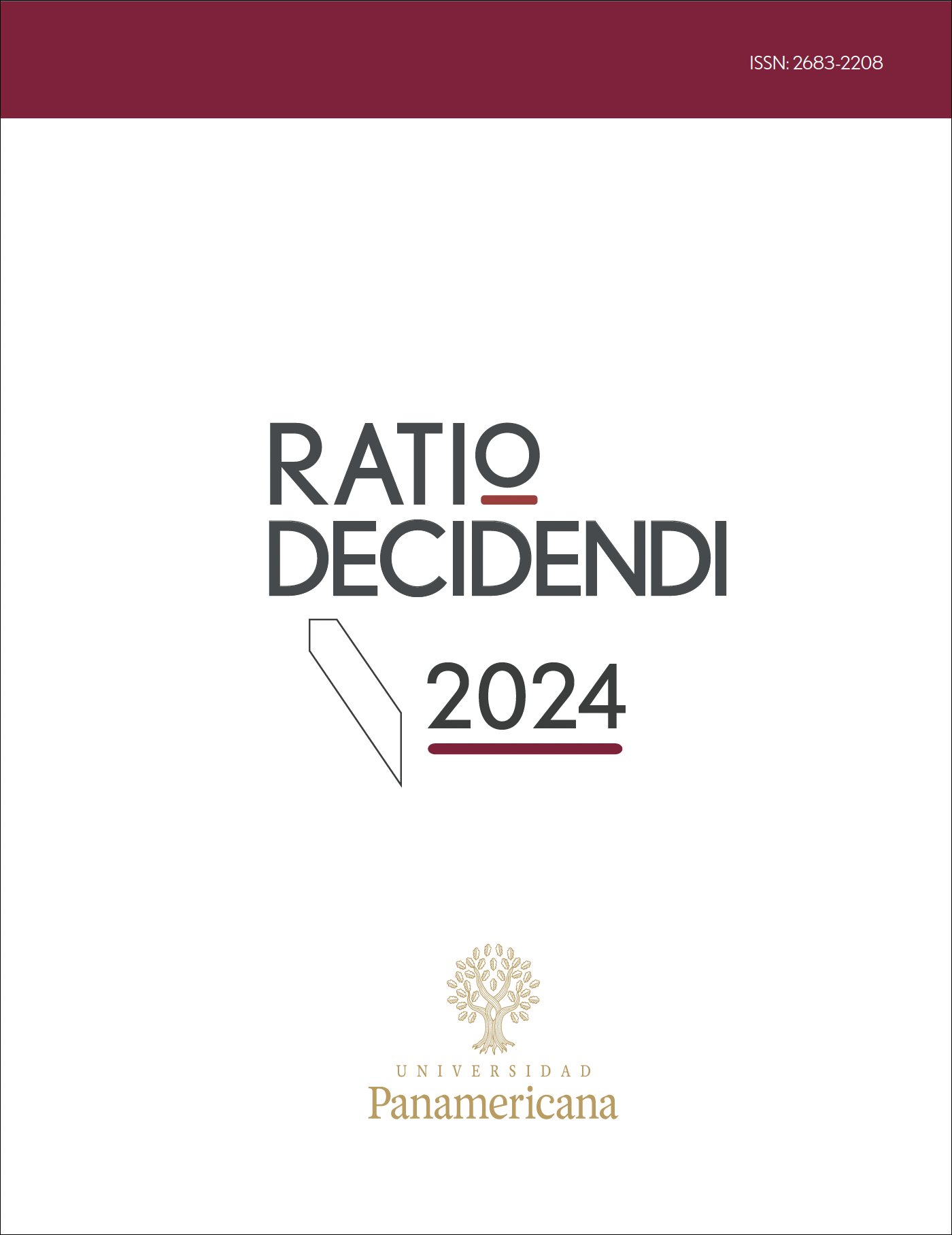When is the social interest affected? Reflections on the provisional protection in the Amparo trial in light of Common Good Constitutionalism
Published 2024-07-13
Keywords
How to Cite
Copyright (c) 2024 Ratio Decidendi

This work is licensed under a Creative Commons Attribution-NonCommercial-NoDerivatives 4.0 International License.
Downloads
Abstract
The suspension in the amparo trial—better understood as a provisional injunction or protection—is contingent upon “no harm being done to the social interest.” However, when and for what reasons could we consider that the social interest is affected? This article aims to answer this question from the perspective of Common Good Constitutionalism. Thus, it will be argued that this constitutional theory allows for a substantive understanding of the social interest that recognizes the dignity of all members of society and is consistent with human rights. It will be argued that the social interest: (I) does not translate into the benefit of many at the expense of a few; (II) does not oppose human rights, as these rights constitute it; and (III) is not a blank check to endorse any subjective preference that the authorities wish to impose on society.
References
- Arista, L. (31 de mayo de 2022). “No van a poder detenernos”, dice AMLO tras suspensión del Tramo 5 del Tren Maya. Expansión Política. https://politica.expansion.mx/presidencia/2022/05/31/no-van-a-poder-detenernos-dice-amlo-suspension-tren-maya
- Casey, C., & Vemerule, A. (2022). Myths of common good constitutionalism. Harvard Journal of Law and Public Policy. 45(1). https://journals.law.harvard.edu/jlpp/wp-content/uploads/sites/90/2022/02/CASEY_VERMEULE_VOL45_ISS1.pdf
- Cianciardo, J. (2020). La cultura de los derechos humanos. Razón, voluntad, diálogo. Universidad Nacional Autónoma de México.
- Decreto por el que se reforman los artículos 129 y 148 de la Ley de Amparo, Reglamentaria de los Artículos 103 y 107 de la Constitución Política de los Estados Unidos Mexicanos, en materia de suspensión del acto reclamado e inconstitucionalidad de normas generales (14 de junio de 2024). Diario Oficial de la Federación. https://dof.gob.mx/nota_detalle.php?codigo=5730585&fecha=14/06/2024#gsc.tab=0
- Dictamen de las Comisiones Unidas de Justicia y de Estudios Legislativos, Segunda, con Proyecto de Decreto por el que se reforman los artículos 129 y 148 de la Ley de Amparo, reglamentaria de los artículos 103 y 107 de la Constitución Política de los Estados Unidos Mexicanos, en materia de suspensión del acto reclamado e inconstitucionalidad de normas generales. 10 de abril de 2024. Cámara de Diputados. http://sil.gobernacion.gob.mx/Archivos/Documentos/2024/04/asun_4747795_20240423_1713909148.pdf
- Estrada Michel, R. (2024). Por un Estado de derecho con adjetivos. Axis. https://www.te.gob.mx/blogEje/front/publicaciones/busqueda/1125
- Finnis, J. (2011). Natural law & natural rights. Oxford University Press.
- Finnis, J. (2000). Ley natural y derechos naturales. Abeledo-Perrot.
- Foran, M. P. (2022). Rights, common good, and the separation of powers. The Modern Law Review (Forthcoming). https://papers.ssrn.com/sol3/papers.cfm?abstract_id=4179424
- Foran, M. P. (2023a). Equal dignity and the common good. Harvard Journal of Law and Public Policy, 46(3). https://journals.law.harvard.edu/jlpp/wpcontent/uploads/sites/90/2024/01/46_3_Final-v3.pdf
- Foran, Michael P. (2023b). Equality bbefore the Law. Hart Publishing.
- Iniciativa del Ejecutivo federal con proyecto de decreto, por el que se reforman, adicionan y derogan diversas disposiciones de la Constitución Política de los Estados Unidos Mexicanos, en materia de reforma del Poder Judicial (2024). Gaceta Parlamentaria, 6457-15. Año XXVII. Cámara de Diputados. LXV Legislatura. https://gaceta.diputados.gob.mx/PDF/65/2024/feb/20240205-15.pdf
- Lopez-Dóriga Digital (8 de junio de 2021). Orden jurídico debe orientarse a la plenitud y felicidad, asegura Margarita Ríos Farjat. López-Dóriga Digital. https://lopezdoriga.com/nacional/margarita-rios-farjat-jueces-justicia-derechos-humanos
- Lopezobrador.org (15 de marzo de 2021). Presidente llama a revisar competencia de juez que suspendió reforma a la Ley de la Industria Eléctrica; envía carta a ministro Arturo Zaldívar. AMLO. https://lopezobrador.org.mx/2021/03/15/presidente-llama-a-revisar-competencia-de-juez-que-suspendio-reforma-a-la-ley-de-la-industria-electrica-envia-carta-a-ministro-arturo-zaldivar
- Massini Correas, C. I. (2019). Jurisprudencia analítica y derecho natural. Marcial Pons.
- Muñoz Acevedo, I. E. (2023). La defensa y remediación de los derechos sociales. Tirant lo Blanch.
- Ortega, A. (29 de agosto de 2019). Abogado asegura que el recurso de “interés nacional” de AMLO es inexistente. Expansión Política. https://politica.expansion.mx/mexico/2019/08/29/abogado-asegura-que-el-recurso-de-interes-nacional-de-amlo-es-inexistente
- Poole, D. (2008). Bien común y Derechos Humanos. Revista Persona y Derecho, 59. https://dadun.unav.edu/bitstream/10171/17355/1/37335616.pdf
- Ramirez García, H. S., & Pallares Yabur, P. J. (2021). Derechos Humanos. Promoción y Dignidad. Tirant lo Blanch.
- Rodríguez Fernández, I. (2022). Las restricciones sacrificiales de los derechos fundamentales. Marcial Pons.
- Sandel, M. J. (2009). Justice. Farrar, Straus and Giroux.
- Vermeule, A. (2022). Common good constitutionalism. Polity Press.
- Welikala, A. (6 de febrero de 2024). Foran’s common good and comparative constitutional law. The New Digest. https://thenewdigest.substack.com/p/forans-common-good-and-comparative

